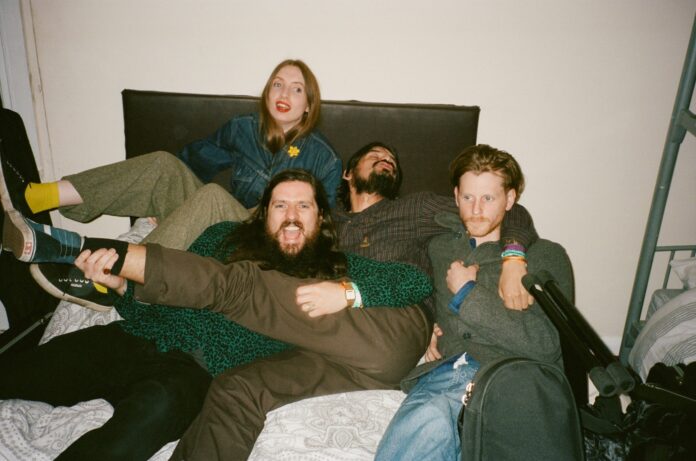Only a handful of years have passed since Dry Cleaning released its first two EPs, Sweet Princess and Boundary Road Snacks and Drinks (which they’re recreating live at The Independent on Thu/21-Fri/22).
Still, the members of the South London post-punk band—known for sparse instrumentation, observational lyrics, and poker-faced spoken-word delivery—can’t easily cast their minds back to the early days when so much has transpired since.
“It’s five years ago that all this happened, but it feels like a completely different world,” says drummer Nick Buxton. “It’s hard for me to return to that point because we were so far away from where we are now.”
Here are just a few of their milestones. They signed to 4AD, released two critically acclaimed albums—New Long Leg (2021) and Stumpwork (2022)—issued two additional EPs, and sold out shows worldwide. Pavement, Duran Duran, and Grace Jones have become ardent fans.
After the whirlwind of success, they are taking a beat to reflect on their journey and honor their roots with the rerelease of Sweet Princess and Boundary Road Snacks and Drinks on one single vinyl pressing—and accompanying tour.
I spoke to Buxton and singer Florence Shaw about the group’s formative years, how the songs on their seminal six-track EPs came together, and the sage advice they received from Simon Le Bon.
48 HILLS You are reissuing and touring your first two EPs. What do you remember about producing them?
NICK BUXTON We’d never played a show as a band. Tom, Lewis, and I did a lot of shows with other bands, and Flo had never done a show as a front person. Recording felt like another step forward.
Help us save local journalism!
Every tax-deductible donation helps us grow to cover the issues that mean the most to our community. Become a 48 Hills Hero and support the only daily progressive news source in the Bay Area.
It felt like a soft way to tick another thing off the box of the things bands do. You write songs together, hang out, and then you might record them and play a show. It was a way to document what we were doing because, after that point, we had to discuss whether we would even play shows at all.
48 HILLS “Magic of Meghan,” on your second EP, focuses on royal outsider Meghan Markle. What was it about her that captivated you?
FLORENCE SHAW She interested me because I could see she would have difficulties. I felt a certain amount of shame about that because I knew what transpired was predictable in a sad way.
48 HILLS The story is that you wrote this song when you suffered a breakup just as Meghan and Harry announced their engagement.
FLORENCE SHAW It was a sense of escapism because of how the BBC reports on anything royal in this rolling way. There was much to consume about it, and I clung to it.
It was self-deprecating as well—a feeling of embarrassment at my humiliation for my relationship ending. Being into this fairy-tale celebrity thing felt exciting, but it was a cringeworthy combination with my shame about not being able to make a relationship work. Rather than that being a serious feeling, I saw the humor in those two things side by side.
48 HILLS How did you develop Dry Cleaning’s signature sound?
NICK BUXTON It wasn’t planned. Everyone’s influences are different, and there’s a large crossover in the middle. A lot of times, playing music together is about compromise. You might bring things to the project, but they’re not all workable. So you spend a lot of time listening, responding, and collectively making it something you’re all happy with.
FLORENCE SHAW It’s unusual how democratically we write the songs.
But as Nick was saying, we all have different references. We’re pulling in various directions, which produces what we sound like.
48 HILLS What were your expectations when working on these projects, and were they met?
NICK BUXTON We recorded the first EP and put it on Bandcamp, hoping someone would find it. We didn’t have a manager. There were no labels. We hadn’t played any shows.
But we started receiving correspondence on Bandcamp from people all over the world. A publicist heard it on Bandcamp within a couple of weeks and got in touch with Lewis—and he does our PR now. That’s never happened to me with any musical project.
FLORENCE SHAW Events overtook us. We had time off from playing shows, and it’s probably the first time I’ve had to try to take in the success because it was such a shock. It’s almost like I returned to my flat, and all of my things were like a time capsule to somewhere in the middle of 2019.
From that point onward, we were so busy that I moved house and didn’t unpack. It’s strange how these years have passed when things went wild. It’s taken a minute to compute it, and I only got around to doing that recently.
48 HILLS How do these two EPs fit into Dry Cleaning’s oeuvre?
FLORENCE SHAW With hindsight, they feel like a document of our first rehearsals. In 2018 we did a laughably small number because we had full-time jobs. Then we played our first show somewhere in there as well. So they feel like a first attempt at something.
We wrote them quickly and instinctively. Many include things like YouTube comments I used in my lyrics because I had no idea how to generate words. I’d always collected bits of writing I liked on my phone. But I never sat down as a writer to write.
It’s so odd because what we were doing was experimental. We got together in a room without knowing what would happen. It’s crazy that it ended up being rereleased by 4AD.

48 HILLS How do you balance experimentation and accessibility in your music?
FLORENCE SHAW What helps is, while we have out-there tastes, we all listen to different kinds of music. We all like accessible music. There’s never a sense we’re dumbing down what we like so other people will like it. And because the vocal style is so particular, maybe there isn’t a need to make something difficult to get into because there’s already this slightly unusual vocal thing.
48 HILLS Florence, from where do you draw inspiration for your lyrics?
FLORENCE SHAW The common denominator is having as empty a mind as possible. I often have a lot of thoughts or ideas I want to turn into lyrics. When I’m on the bus or the train, in the bath or bed with my eyes closed but not asleep yet—those empty times.
I’ve got a lot of detritus in my brain—anxious thoughts about too many different subjects. I’m farming all of that.
It’s trying to preserve stuff I know would go if I don’t write it down. And I don’t plan things; things wind up on a theme. And then, when I sift through all the stuff, it so happens to fit into these four subjects. Then, those are four songs.
48 HILLS What’s it like singing your early songs today?
FLORENCE SHAW It’s not easy. You tend to think about what you would change about them. On the other hand, I feel a sense of pride about how I’ve gotten to grips with writing since we recorded those EPs because things happen so fast, and it’s hard to track your evolution.
It’s easy for me to hear the difference in the writing—which has its appeal—but it’s different from how I write now. Also, it’s easier to tell what the songs are about in hindsight. Sometimes it’s emotional. I picture myself at that low time, certainly much lower than now. It’s like a little window into the past and how I felt. I sometimes feel empathy for that person.
48 HILLS I imagine that over the years, you’ve met some of your heroes at gigs and festivals. Have any admitted to being fans?
FLORENCE SHAW We met Pavement when we played at the Bluedot Festival last year, and they were complimentary. We played before them on a big stage, and they gave us a shout-out.
We supported Duran Duran at a big gig at a stately home in Yorkshire. Because Simon Le Bon is a fan of our band, he invited us to play with them. We were the only support. I was starstruck. Some of their records were in my house when I was a kid, and I used to play them, so it was a surreal moment. He was so kind. He took time to chat with us and gave us advice. He made us feel confident again.
48 HILLS What advice did he give you?
FLORENCE SHAW His number-one piece of advice was to demand you have a break. He said, “They’ll schedule you until your eyes pop out, and if you politely request, you won’t get it. You’ll keep going until your vocal cords will stop working. That’s what happened to me. So you have to be firm about getting time off from touring.” It was great advice.
NICK BUXTON He said, “You have to be able to sleep as much as you can. You have to adapt and learn how to sleep in any situation. If you have 15 minutes, try to sleep for at least five of them.”
We haven’t met Grace Jones, but we did play London’s Meltdown Festival when she curated it. It felt gratifying to be asked and have that seal of approval.
48 HILLS Your San Francisco shows regularly sell out in minutes. What is it about playing in this city that excites you?
FLORENCE SHAW It’s impossible not to mention the extreme street life in San Francisco. On one hand, you’ve got the Tenderloin with driverless cars driving through it. We’ve never seen anything that represents the great divide as much as that in our travels.
NICK BUXTON San Francisco is a place I’m keen to see more of. Like Flo says, it’s a very disparate city, which I find intriguing. But then, San Francisco is beautiful and instantly recognizable. I would love to go to Alcatraz, Golden Gate Bridge, and Golden Gate Park.
FLORENCE SHAW I want to go to Creative Growth in Oakland, a center where adults with various learning disabilities make art. It’s a world-famous studio where people are empowered to create sculptures, drawings, and paintings. I’ve known about it for years but have never managed to visit.
48 HILLS What’s next for the band?
NICK BUXTON We’re chomping at the bit to dig into our next album and create something we love. It’s exciting because we’ve never had this much context as a band behind us. There’s never been as much thought and creative space around what’s coming next.
DRY CLEANING Thu/21-Fri/22, The Independent, SF. $30. Tickets and more info here.





